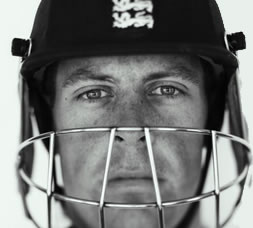Sunday, November 19, 2006
The Hidden Cost of Test Match Cricket
 Like one or two other political bloggers I occasionally post on sport. My main obsession under this head is cricket so I'm exercizing blogger's prerogative to comment on Mike Brearley's thoughtful article in today's Observer: cricketers and depression. Most fans of the summer game were concerned when Marcus Trescothick flew home from India with a mystery 'virus' which became even more mysterious when it morphed into a 'stress-related' illness. However, we were re-assured our ultra-reliable opener and ace first slip he would storm back to defend the Ashes so famously won in 2005. Yet his batting has never recovered and he has recently flown home from Australia, in some distress, with a recurrence of the same condition.
Like one or two other political bloggers I occasionally post on sport. My main obsession under this head is cricket so I'm exercizing blogger's prerogative to comment on Mike Brearley's thoughtful article in today's Observer: cricketers and depression. Most fans of the summer game were concerned when Marcus Trescothick flew home from India with a mystery 'virus' which became even more mysterious when it morphed into a 'stress-related' illness. However, we were re-assured our ultra-reliable opener and ace first slip he would storm back to defend the Ashes so famously won in 2005. Yet his batting has never recovered and he has recently flown home from Australia, in some distress, with a recurrence of the same condition. Most sports fans wonder at why Trez, an apparently rustically robust kind of guy who epitomizes the down to earth qualities of Somerset folk, should display symptoms so rarely associated with professional sportsmen whose nerves often seem so tempered by the rigours of their profession as to calmly sustain situations which akin to fighting in the front line of a real life war. Yet we are misled if we believe this. Brearley quotes the study by Davd Frith, Silence of the Heart which catalogues no less than 150 cricketers who committed suicide, the most surprising of which more recently, perhaps, being the extroverted Yorkshireman David Bairstow.
Brearley makes the point that county cricket can seem, as it did to Peter Roebuck, to resemble permanent 'trench warfare' and that, while it is a team game, the essence of it involves public individual confrontations, sometimes under the most demanding of pressures, for example that of Atherton against South African fast bowler Allan Donald in 1998. We, the supporters thrill to such epic clashes-and the sportsmen tell us time and again that this kind of pressure cooker tension is what they most relish about their calling- but maybe there is a cost we don't see or even wish to acknowledge.
Most cricketers end their lives after retirement, shorn of the validating triumphs and supportive collectivity in defeat, but Trescothick -he'll be 31 on Christamas Day- is some way off that. Personally I'm concerned, of course, that his absence will make us, all too legitimately, the underdogs when the action starts next Thursday and that lack of his experienced and calming presence will adversely influence the mood of the team when such qualities are most needed. As for him, I'm concerned that such a dramatic failing of a sportsman's natural confidence and combativeness will have prematurely ended an otherwise great sporting career.
Comments:
<< Home
Did you hear about those two Indian schoolboys who have achieved some fantastic runs, beating even their own champion's record while at school? They hope to be plucked to stardom too.
I guess there is a lot of pressure with sport, maybe they need to practise relaxation techniques. It must be difficult being a high profile sportsman.
I guess there is a lot of pressure with sport, maybe they need to practise relaxation techniques. It must be difficult being a high profile sportsman.
Good post, but I suspect that Trescothick's difficulties actually revolve around touring, rather than playing cricket per se. It seems to me that he has a rather emotionally demanding partner who dislikes him going on tour on that "bad phonecalls" between the pair triggered his disintegration both in India earlier this year and in Oz last week.
Post a Comment
<< Home




